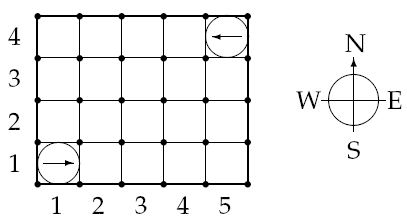标签:
Crashing Robots
| Time Limit: 1000MS |
|
Memory Limit: 65536K |
| Total Submissions: 8388 |
|
Accepted: 3631 |
Description
In a modernized warehouse, robots are used to fetch the goods. Careful planning is needed to ensure that the robots reach their destinations without crashing into each other. Of course, all warehouses are rectangular, and all robots occupy a circular floor space with a diameter of 1 meter. Assume there are N robots, numbered from 1 through N. You will get to know the position and orientation of each robot, and all the instructions, which are carefully (and mindlessly) followed by the robots. Instructions are processed in the order they come. No two robots move simultaneously; a robot always completes its move before the next one starts moving.
A robot crashes with a wall if it attempts to move outside the area
of the warehouse, and two robots crash with each other if they ever try
to occupy the same spot.
Input
The
first line of input is K, the number of test cases. Each test case
starts with one line consisting of two integers, 1 <= A, B <= 100,
giving the size of the warehouse in meters. A is the length in the
EW-direction, and B in the NS-direction.
The second line contains two integers, 1 <= N, M <= 100, denoting the numbers of robots and instructions respectively.
Then follow N lines with two integers, 1 <= Xi <= A, 1 <=
Yi <= B and one letter (N, S, E or W), giving the starting position
and direction of each robot, in order from 1 through N. No two robots
start at the same position.

Figure 1: The starting positions of the robots in the sample warehouse
Finally there are M lines, giving the instructions in sequential order.
An instruction has the following format:
< robot #> < action> < repeat>
Where is one of
- L: turn left 90 degrees,
- R: turn right 90 degrees, or
- F: move forward one meter,
and 1 <= < repeat> <= 100 is the number of times the robot should perform this single move.
Output
Output one line for each test case:
- Robot i crashes into the wall, if robot i crashes into a
wall. (A robot crashes into a wall if Xi = 0, Xi = A + 1, Yi = 0 or Yi =
B + 1.)
- Robot i crashes into robot j, if robots i and j crash, and i is the moving robot.
- OK, if no crashing occurs.
Only the first crash is to be reported.
Sample Input
4
5 4
2 2
1 1 E
5 4 W
1 F 7
2 F 7
5 4
2 4
1 1 E
5 4 W
1 F 3
2 F 1
1 L 1
1 F 3
5 4
2 2
1 1 E
5 4 W
1 L 96
1 F 2
5 4
2 3
1 1 E
5 4 W
1 F 4
1 L 1
1 F 20
Sample Output
Robot 1 crashes into the wall
Robot 1 crashes into robot 2
OK
Robot 1 crashes into robot 2
Source
给跪了
做的时候不到一个小时就完事了。结果找bug找了4个小时,就是一个变量写错了,怎么都找不到啊
zuile,醉了
#include<iostream>
#include<stdio.h>
#include<string.h>
using namespace std;
struct node{
int x;
int y;
int z;
}que[200];
int next[4][2]= {0,1,-1,0,0,-1,1,0};
int ans, tx,ty;
int vis[105][105];
int y,x;
void update1(){
int xx=que[tx].x;
int yy=que[tx].y;
int zz=que[tx].z;
for(int i=1; i<=ty; i++){
xx+=next[zz][0];
yy+=next[zz][1];
if(xx<1||xx>x||yy<1||yy>y){
printf("Robot %d crashes into the wall\n",tx);
ans=1;
return;
}
if(vis[xx][yy]!=0){
printf("Robot %d crashes into robot %d\n",tx,vis[xx][yy]);
ans=1;
return;
}
}
vis[xx][yy]=tx;
vis[que[tx].x][que[tx].y]=0;
que[tx].x=xx;
que[tx].y=yy;
}
void update2(){
que[tx].z=(que[tx].z+ty%4)%4;
}
void update3(){
que[tx].z=(que[tx].z-ty%4+4)%4;
}
int main(){
int t,n,m;
char c;
scanf("%d",&t);
while(t--){
memset(vis,0,sizeof(vis));
memset(que,0,sizeof(que));
scanf("%d%d",&x,&y);
scanf("%d%d",&n,&m);
for(int i=1; i<=n; i++){
scanf("%d %d %c",&que[i].x,&que[i].y,&c);
if(c==‘N‘) que[i].z=0;
else if(c==‘W‘) que[i].z=1;
else if(c==‘S‘) que[i].z=2;
else if(c==‘E‘) que[i].z=3;
vis[que[i].x][que[i].y]=i;
}
ans=0;
for(int i=1; i<=m; i++){
scanf("%d %c %d",&tx,&c,&ty);
if(ans==0){
if(c==‘F‘)
update1();
else if(c==‘L‘)
update2();
else if(c==‘R‘)
update3();
}
}
if(ans==0)
printf("OK\n");
}
return 0;
}
poj2632 模拟
标签:
原文地址:http://www.cnblogs.com/13224ACMer/p/4628627.html
